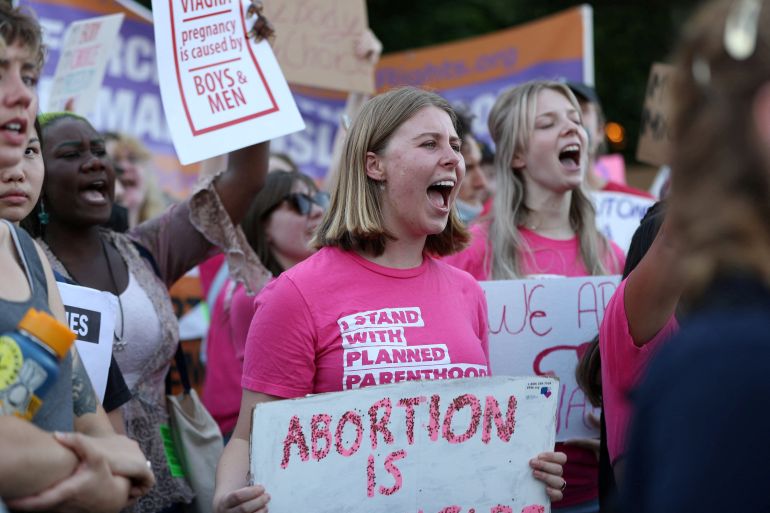Georgia patients sent home after abortion ban comes into effect
US court allows six-week abortion ban to come into force in Georgia, forcing clinics to swiftly turn away patients.

When the abortion law in the US state of Georgia abruptly changed this week, some patients waiting for the procedure that had been legal just hours earlier had to be turned away.
Melissa Grant, chief operating officer of Carafem, a Washington-based group that operates a reproductive health clinic in Atlanta, called the process of sending home four patients terrible.
Keep reading
list of 3 itemsUS abortion rights: Arizona judge blocks ‘personhood’ law
Texas contests federal order to grant life-saving abortions
“It was difficult every time the staff had to bring it up, whether it was someone on the phone for tomorrow or somebody in the office today,” Grant told The Associated Press news agency.
“They would have to resteel themselves in order to try to be empathetic and understanding in the face of someone who was either going to fall apart, cry, get angry or try to bargain — ‘Isn’t there some way you can still see me?'”
The Georgia law banning abortion when a fetal heartbeat is detected, typically around six weeks, took effect on Wednesday afternoon after a federal appeals court earlier that day rejected a challenge to it by abortion providers.
Chief Judge William Pryor of the Atlanta-based 11th US Circuit Court of Appeals wrote for a unanimous three-judge panel that the state had a “rational basis” for the law, given its interest in “providing full legal recognition to an unborn child”.
Normally, the Georgia ruling would not take effect for weeks, but the court issued a second order on Wednesday allowing the law to take effect immediately.
Georgia passed the law, which also defines “person” to include an “unborn child”, in 2019. A federal judge blocked it that October before it could take effect, finding it violated the right to abortion established by the US Supreme Court in its 1973 landmark Roe v Wade ruling.
However, the Supreme Court on June 24 overturned that precedent-setting ruling, clearing the way for Wednesday’s decision. The law includes exceptions for medical emergencies, and for cases of rape or incest where a police report was filed.
“This is a grave human rights violation, and Planned Parenthood, along with its partners, will do everything in our power to fight back and ensure all people can get the health care they need, regardless of where they live,” Alexis McGill Johnson, president of Planned Parenthood, one of the providers in the lawsuit, said in a statement.
Legal battles are being waged across the US to shape the country’s post-Roe landscape, as conservative states push for restrictions while the federal government and liberal states look for ways to maintain access to abortion.
According to the Guttmacher Institute, a reproductive rights group, at least 26 US states are expected to try to ban abortion in the aftermath of the Supreme Court’s overturning of Roe.
Rights advocates have argued that abortion bans will disproportionately harm Black people and low-income Americans.
Meanwhile, a Louisiana judge on Thursday barred the state from enforcing “trigger” laws designed to ban abortions after the US Supreme Court overturned Roe.
Hope Medical Group for Women in Shreveport, one of Louisiana’s three abortion clinics, sued to resume services, arguing the trigger laws were vague, conflicted with each other and violated its state constitutional due process rights.
A New Orleans judge on June 27 temporarily blocked the laws’ enforcement, but they went back into effect after a different judge on July 8 transferred the case to Baton Rouge.
Judge Donald Johnson then put a temporary hold on the laws’ enforcement on July 12 while he considered whether to issue Thursday’s preliminary injunction, which remains in effect until a trial can be held on the clinic’s request for a permanent order.
“Today’s ruling is critical in ensuring that women in Louisiana continue to have access to comprehensive – and sometimes life-saving – healthcare services,” Joanna Wright, the clinic’s lawyer, said in a statement.
Clinics in Baton Rouge and New Orleans that had ceased operations pending the ruling said they were open again on Thursday.
But in Georgia, one of the biggest states to see sweeping restrictions on abortion, Grant said Carafem has cancelled more than 75 appointments for women beyond six weeks of pregnancy since the restriction came into effect on Wednesday.
The National Abortion Federation listed 10 clinics providing surgical abortions in the state before Wednesday, although an 11th clinic in Savannah had already closed after the Supreme Court acted.